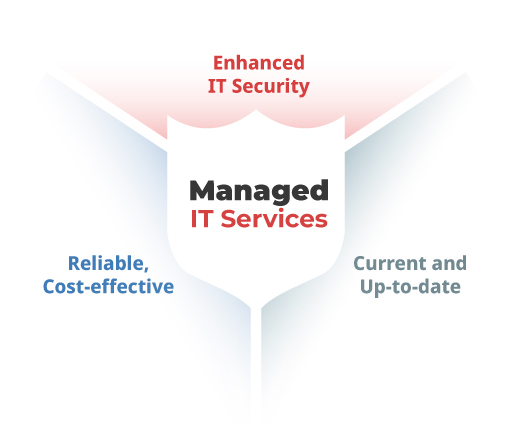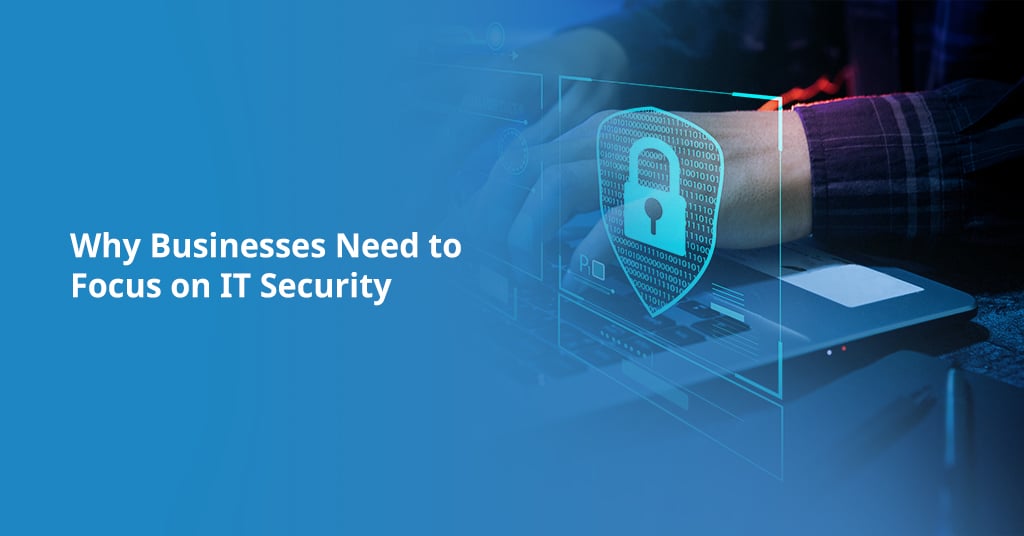As businesses shift toward working digitally in many industries, the need for robust IT security is now stronger than ever. According to a 2021 online report from AI-powered IT security firm Sophos, cyberattacks are becoming more and more sophisticated these days. Many organizations find such attacks too advanced for their IT teams to handle independently. Furthermore, Technology magazine reports there is an increased investment in cybersecurity in 2021 compared to 2020.
Why worry about IT security?
IT security is the bedrock for smooth, streamlined, and uninterrupted business operations. Given the importance of data for businesses, cybersecurity — or the protection of information stored on computer systems — takes center stage. With more businesses shifting to the digital landscape, businesses now need to ensure better safety for their data and that of their customers.
Security challenges and how they look
Cyberattacks can target business hardware and cripple operations physically. Security challenges can take different forms:
- Attacks on data stored within systems inside a business’s premises
- Attacks to corrupt or damage the system in a way that slows it down and turns away customers
- Attacks that disrupt the normal functions and operations within the business
Some of the more severe cyberattacks include:
DDoS attacks
DDoS, or Distributed Denial of Service, is a cyberattack routed through the internet. A DDoS attack involves overriding certain internet protocols in a way that interrupts a business’s normal operations or functions. This function usually affects the server, overwhelming even advanced computer systems through sheer volume and carefully synchronized attack frequency. Once computer systems are infected or compromised, the attack slows down systems for the end-user. This means all businesses that utilize the internet or cloud services are at risk.
Ransomware attacks
Ransomware is a security threat where businesses need to pay money to regain access to their data. Sources say the average ransom paid by organizations today is $170,404. And even after paying the ransom, only 8 percent of organizations managed to retrieve all their data, while 29 percent received around half of their data.
Phishing attacks
As the name suggests, phishing attacks involve a careful and concerted gathering of information from unsuspecting users. This includes business stakeholders, end-users, and customers. If adequate training is not provided, this can lead to severe leaks in data and information, which can jeopardize business sustainability and continuity.
What are the security elements you need to put into place?
Reports say that in 2021, nearly 40 percent of breaches featured phishing. Around 11 percent featured malware, and about 22 percent featured hacking. Each of these can cause both short-term and long-term damage to businesses.
A lack of a robust IT security system can negatively impact your business:

1. Damage to business goodwill and reputation
IT security breaches can prove to be devastating to a painstakingly built business. This is especially true of fast-growing organizations that may have had to start from scratch. An IT security breach is particularly damaging because it has far-reaching consequences for a client’s data. The loss of trust in such a case can be irreversible and harsh—it can also negatively impact client businesses, which can lead them to avoid your business in the future. Worse, it can influence word-of-mouth publicity because the business will be associated with poor safety parameters or seen as incompetent. Either way, this causes well-earned goodwill to be tarnished and can also impact any potential future collaborations or chance for the business to recover.
2. Far-reaching financial harm
Aside from the damage to goodwill and reputation, damage to IT security can also cause a substantial financial downfall. Companies may be unable to secure loans and financial help in the future. Businesses that have worked hard at building a loyal customer base and a pipeline for the future can find themselves in danger of losing all these assets in a single IT security breach.
3. Legal implications and long-term hassles
A data security breach can also lead to legal hassles for a business. Typically, companies may conduct an internal review immediately following a data breach to assess the damage. Next, the leadership may take active steps to block a repeat attack. The company may identify whether negligence caused it. If so, it could take steps such as replacing key resources wherever possible.
4. Loss of business continuity
Several businesses are still fighting economic setbacks caused by COVID-19. Nevertheless, a security breach can still disturb even the most well-established businesses. It can potentially affect the morale of the business stakeholders. This includes the end-user, who may question the trustworthiness of the business. Also, employees may feel that they get blamed for consequences that are not entirely under their control.
Why choose professional assistance?
IT security is an ongoing process. It requires regular upgrades and updates to ensure complete protection for the business and its stakeholders.
- A single cyber-attack could destabilize a business entirely.
- Once the business is attacked, it could take longer to recover its trust, goodwill, and financial well-being.
- Client goodwill, once impacted, may never recover enough to allow the business to become successful or sustainable again.
- In addition to protracted legal battles, long-term damage may also occur, which can cause profound harm to client businesses.
- Managed IT services agencies professionally manage infrastructures that are regularly updated and routinely upgraded.
- Most hackers who launch cyberattacks understand the latest technologies and know the IT world like the back of their hand. A single attack is often all it may take to cause irreparable damage.
Next Steps
- Learn more about the benefits of professionally managed IT services and how they can help boost your business profitability.
- Email us at sales@analytix.com or call us at 781.503.9003 today.
- Follow our blog for industry trends and the latest updates.
- Engage with us on LinkedIn and Twitter.
